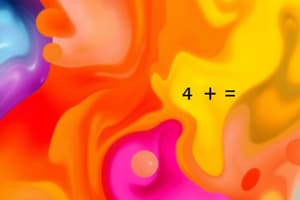Podcast
Questions and Answers
If a 7 x 6 matrix A has a null space with a dimension of 5, what is the dimension of the column space of A?
If a 7 x 6 matrix A has a null space with a dimension of 5, what is the dimension of the column space of A?
- 6
- 5
- 1 (correct)
- 7
The eigenvectors of a matrix remain unchanged, up to a scalar multiple, after what operation?
The eigenvectors of a matrix remain unchanged, up to a scalar multiple, after what operation?
- Division
- Matrix Multiplication (correct)
- Addition
- Subtraction
Given a mapping T: $R^2 \rightarrow R^2$, which of the following properties must be shown to prove T is a linear transformation?
Given a mapping T: $R^2 \rightarrow R^2$, which of the following properties must be shown to prove T is a linear transformation?
- Neither T(u + v) = T(u) + T(v) nor T(cu) = cT(u)
- T(cu) = cT(u) only
- Both T(u + v) = T(u) + T(v) and T(cu) = cT(u) (correct)
- T(u + v) = T(u) + T(v) only
What is the first step in finding the eigenvalues of a matrix A?
What is the first step in finding the eigenvalues of a matrix A?
What is the dimension of $R^2$?
What is the dimension of $R^2$?
What must be true for a transformation to be considered linear?
What must be true for a transformation to be considered linear?
What is the determinant of the 2x2 identity matrix?
What is the determinant of the 2x2 identity matrix?
If A is a square matrix then what is an eigenvector of A?
If A is a square matrix then what is an eigenvector of A?
What is the null space of a matrix A?
What is the null space of a matrix A?
What is a real eigenvalue of a matrix?
What is a real eigenvalue of a matrix?
Flashcards
Column space dimension
Column space dimension
The dimension of the column space of a matrix A is equal to the number of pivot columns in A.
Eigenvector
Eigenvector
A non-zero vector that, when multiplied by a given matrix, results in a scalar multiple of itself. These vectors remain on the same span when the transformation is applied.
Eigenvalue
Eigenvalue
A scalar that satisfies the equation Av = lambdav, where A is a matrix, v is an eigenvector, and lambda is the eigenvalue.
Linear Transformation
Linear Transformation
Signup and view all the flashcards
Nullity
Nullity
Signup and view all the flashcards
Study Notes
- A random variable $X$ is continuous if its set of possible values is uncountable.
Examples of Continuous Random Variables
- Height of a randomly chosen person
- Time it takes for a computer to complete a task
- Temperature of a room
Probability Density Function (PDF)
- A continuous random variable $X$ has a PDF $f(x)$ if:
- $f(x) \geq 0$ for all $x$.
- $\int_{-\infty}^{\infty} f(x) dx = 1$.
- For any $a \leq b$, $P(a \leq X \leq b) = \int_{a}^{b} f(x) dx$
- $f(x)$ represents probability density, not probability
- $P(X = a) = 0$ for any $a$
Cumulative Distribution Function (CDF)
- The CDF of a continuous random variable $X$ is: $F(x) = P(X \leq x) = \int_{-\infty}^{x} f(t) dt$
Properties of CDF
- $F(x)$ is non-decreasing
- $\lim_{x \to -\infty} F(x) = 0$
- $\lim_{x \to \infty} F(x) = 1$
PDF from CDF
- $f(x) = \frac{d}{dx} F(x)$
Expected Value
- The expected value of a continuous random variable $X$ is: $E[X] = \int_{-\infty}^{\infty} x f(x) dx$
Expected Value of a Function
- $E[g(X)] = \int_{-\infty}^{\infty} g(x) f(x) dx$
Variance
- The variance of a continuous random variable $X$ is: $Var(X) = E[(X - E[X])^2] = E[X^2] - (E[X])^2$
Example Problem
- Given PDF: $f(x) = \begin{cases} cx^2 & 0 \leq x \leq 1 \ 0 & \text{otherwise} \end{cases}$
- Find $c$, $P(0 \leq X \leq \frac{1}{2})$, $E[X]$, and $Var(X)$
Solution for $c$
- solve $\int_{-\infty}^{\infty} f(x) dx = 1$ to find c
- $\int_{0}^{1} cx^2 dx = 1$
- $c [\frac{x^3}{3}]_{0}^{1} = 1$
- $c (\frac{1}{3} - 0) = 1$
- $c = 3$
Solution for $P(0 \leq X \leq \frac{1}{2})$
- Calculate $P(0 \leq X \leq \frac{1}{2}) = \int_{0}^{\frac{1}{2}} 3x^2 dx$
- $= [x^3]_{0}^{\frac{1}{2}} = (\frac{1}{2})^3 - 0^3 = \frac{1}{8}$
Solution for $E[X]$
- Using $E[X] = \int_{-\infty}^{\infty} x f(x) dx$
- $E[X] = \int_{0}^{1} x \cdot 3x^2 dx = 3 \int_{0}^{1} x^3 dx$
- $= 3[\frac{x^4}{4}]_{0}^{1} = 3(\frac{1}{4} - 0) = \frac{3}{4}$
Solution for $Var(X)$
- Use $Var(X) = E[X^2] - (E[X])^2$
- First find $E[X^2] = \int_{-\infty}^{\infty} x^2 f(x) dx = \int_{0}^{1} x^2 \cdot 3x^2 dx$
- $= 3 \int_{0}^{1} x^4 dx = 3 [\frac{x^5}{5}]_{0}^{1} = 3 (\frac{1}{5} - 0) = \frac{3}{5}$
- $Var(X) = \frac{3}{5} - (\frac{3}{4})^2 = \frac{3}{5} - \frac{9}{16} = \frac{48 - 45}{80} = \frac{3}{80}$
Studying That Suits You
Use AI to generate personalized quizzes and flashcards to suit your learning preferences.




